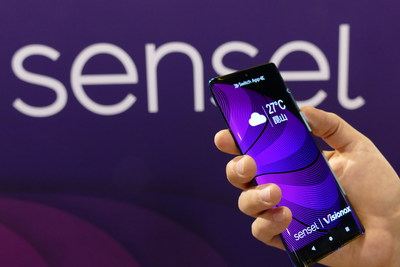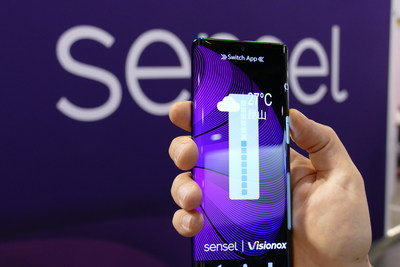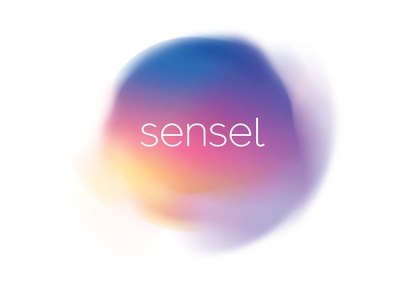LAS VEGAS, Jan. 7, 2020 /PRNewswire/ -- Sensel the company enhancing creativity, productivity and fun through better user interfaces, has integrated its Pressure Grid™ sensor array along the edges of a phone prototype. To help make this demonstration a reality, Sensel collaborated with Visionox Technology Inc. (Visonox), the world's leading supplier of advanced displays. Sensel is unveiling this technology at CES 2020, and can be found in LVCC, South Hall 1 - 20935.

Sensel's patented touch technology offers two functions in a single, ultra-thin sensor: position reporting with high accuracy, and force sensing with the ability to measure force from <1g to 5kg independently for each contact point. It can be integrated behind a flexible AMOLED display, a non-display touchpad, or any surface area where a hi-res force sensing experience should be desired.
To help unveil Sensel technology in a revolutionary side-sensing developer phone, Visionox provided a flexible AMOLED display module that curves around the edges. Sensel integrated its force sensing technology under the curved display, maximizing screen real estate while opening up a wide range of game-changing applications that CES attendees will get an exclusive first look at.
Applications and benefits of Sensel Technology include:
- It knows the user's intention: It accurately measures force and can distinguish if a user is simply holding their phone or is intentionally pressing on the edge.
- It recognizes grip: The rich force image detects whether the user is holding the phone using their left hand, right hand or both hands. This allows the UI to accommodate the user -- for example, changing the location of the keyboard or volume buttons.
- It measures force: This ability allows buttons to respond differently based on the amount of force applied. For example, a camera button can have three different force levels – focus, shoot, and burst. Different haptic effects can be fired at each level.
- It moves with the user: Because the positions of buttons are software controlled the buttons can move to different locations depending on how the user is holding the device (even upside down).
- It works with gloves or in a pocket: Users can squeeze to silence their phone – whether it's in their pocket or they're wearing gloves.
"We use our phones constantly, but our interactions are almost entirely limited to the screen and a couple buttons along the edges," said Sensel CEO and Co-founder Ilya Rosenberg. "At Sensel, we believe mobile devices should be able to capture the complete richness of human touch, not just on the screen, but on the sides and beyond. Ultimately, we teamed up with Visionox to create a developer phone that understands what people want to do based where they hold it, how hard they touch it, and more. That's the future of touch interaction."
ABOUT SENSEL
Ilya Rosenberg and Aaron Zarraga founded Sensel to bring true human touch into computing with PressureGrid™ technology. Having grown to close to 50 team members, thousands of customers, and several large-scale enterprise clients, Sensel is working to redefine computer interaction to combine pressure sensitivity and multi-touch, to meet the environmental challenges of ubiquitous computing. Sensel's first product, the Morph, won "Best in Show" at the SXSW 2017 Interactive Innovation Awards, was named the "Best MIDI Controller" at NAMM 2019 by MusicRadar, and is currently shipping to customers worldwide. The team is integrating their pressure-responsive sensors into trackpads, displays, and everything else that involves human interaction.
ABOUT VISIONOX TECHNOLOGY INC.
Visionox is the world's leading supplier of integrated advanced display solutions. Visionox was founded in 2001, and its origin can be traced to the Tsinghua University OLED research group established in 1996. The company operates under a vision of "pushing boundaries to enhance the experience of vision" and a mission of "leading China's OLED industry through technological innovation." With over 20 years of experience in OLED technology, Visionox has become a globally leading enterprise in the OLED industry, covering R&D, production, and sales.
To schedule an interview with Sensel's executive team, contact matt@sensel.com


SOURCE Sensel



